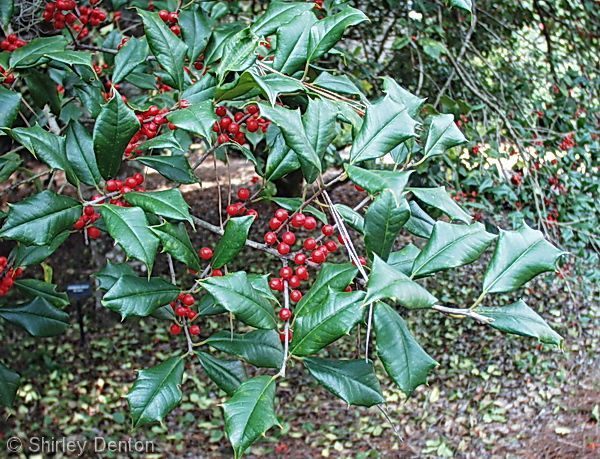FNPS Plant Database
Ilex opaca
Nomenclature
Common Name:
Synonym(s):
Genus species:
Family:
Aquifoliaceae
Plant Specifics
Form:
Size:
Life Span:
Long-lived perennial
Flower Color:
Fruit Color:
Phenology:
Noted For:
Landscaping
Recommended Uses:
Considerations:
Availability:
Propagation:
Light:
Moisture Tolerance:
Always Flooded---------------------------------Extremely Dry
□□□□□□□□□□□□□□□■■■■■■■■■■■■■■■■■■■■■□□□□□□
Usually moist, occasional inundation -to- Somewhat long very dry periods
Salt Water Flooding Tolerance:
Unknown
Salt Spray/Salty Soil Tolerance:
Low/no tolerance of salty wind or direct salt spray
Soil or Other Substrate:
Sand, Loam
Soil pH:
Suitable to Grow In:
8A,8B,9A,9B,10A

USDA zones are based on the average annual extreme minimum winter temperature.
Don't know your zone? Click here to search by zip code.
Vouchered In:
Ecology
Wildlife:
Bees pollinate flowers.
Fruits are eaten by birds.
Native Habitats:
Comments:
Ethnobotany:
General Comments:
Citations:
Burns, Russell M, and Barbara H. Honkala [Technical coordinators]. (1990). Silvics of North America: Volume 2. Hardwoods. United States Department of Agriculture (USDA), Forest Service, Agriculture Handbook 654. ( https://www.fs.usda.gov/treesearch/pubs/1548 ). Accessed 2025.
Fox, Laurie, and Joel Koci. (2021). Trees and Shrubs that Tolerate Saline Conditions. ( https://www.pubs.ext.vt.edu/430/430-031/430-031.html ). Accessed 2026. Virginia Cooperative Extension, Virginia Tech, Blacksburg, VA.
Haehle, Robert G. and Joan Brookwell. (1999). Native Florida Plants. Gulf Publishing Company. Houston, TX.
Huegel, Craig N. (2010). Native Plant Landscaping for Florida Wildlife. University Press of Florida, Gainesville, FL.
Nelson, Gil. (2003). Florida's Best Landscape Plants: 200 Readily Available Species for Homeowners and Professionals. University Press of Florida, Gainesville, FL.
Osorio, Rufino. (2001). A Gardener's Guide to Florida's Native Plants. University Press of Florida, Gainesville, FL.
University of Tennessee Extension Service. (2010). Desired pH Range and salt tolerance of common nursery plants. ( https://plantsciences.tennessee.edu/wp-content/uploads/sites/25/2021/10/Desired-pH-Range-List.pdf ). Accessed 2026. University of Tennessee Extension, Knoxville, TN.
Watkins, John, and Thomas Sheehan. (1975). Florida Landscape Plants, Native and Exotic. University Presses of Florida, Gainesville, FL.
Wunderlin, R. P, B. F. Hansen, A. R. Franck, and F. B. Essig. (1999+). Atlas of Florida Plants. ( https://florida.plantatlas.usf.edu/ ). [S. M. Landry and K. N. Campbell (application development), USF Water Institute.] Institute for Systematic Botany, University of South Florida, Tampa, FL.









